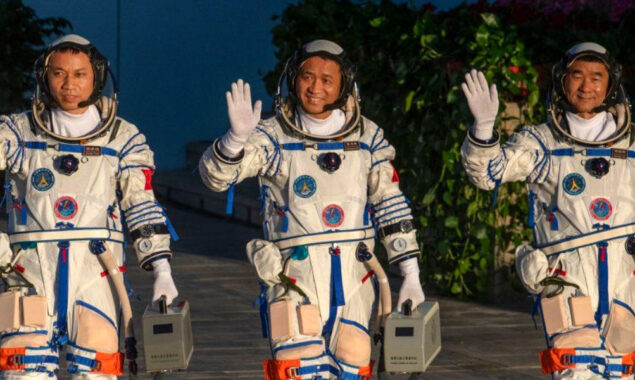British man captured and abused in Ukraine
According to his relatives, a British soldier fighting with the Ukrainians has...

Three Chinese astronauts returned to Earth on Saturday, finishing the country’s longest-ever crewed space mission, according to official broadcaster CCTV.
After landing a rover on Mars and sending probes to the Moon, Beijing is aiming to become a major space power that can compete with the United States.
At about 10 am Beijing time on Sunday, the three crew members – Zhai Zhigang, Ye Guangfu and Wang Yaping – were safely returned to Earth in a tiny capsule.
State-run television CCTV said that the re-entry capsule of Shenzhou 13 has safely landed.
Ground staff, who had stayed clear of the landing site, raced to the capsule in helicopters, as shown on live CCTV video.
The ground team cheered when the astronauts reported that they were “feeling well.”
For the second of four crewed missions in 2021-2022, the Shenzhou-13 blasted out from China’s Gobi Desert in the northern province of Yunnan in October as part of the country’s first permanent space station, Tiangong, which means “heavenly palace.”
Last November, Wang became the first Chinese woman in space history when she and her colleague Zhai completed a six-hour spacewalk to install equipment on board the International Space Station.
Former fighter pilot Zhai, 55, led China’s first space walk in 2008, and P.L.A. pilot Ye is in charge of the mission.
During their stay in orbit, the trio has undertaken two spacewalks, performed several scientific experiments, installed equipment, and tested future building technologies.
Over the last several weeks, the astronauts have been cleaning and prepping the Shenzhou-14’s cabin for its next crew. The Shenzhou-14 is scheduled to launch in the coming months.
Last year’s Shenzhou-12 mission, which lasted 92 days, was China’s previous record for a spaceflight mission.
China’s official television CCTV has announced that six months will be the standard length of time that astronauts would spend on board the country’s orbiting space station.
The second-largest economy in the world has poured billions of dollars on a military-run space programme with the goal of establishing a permanently manned space station by 2022 and ultimately transporting people to the Moon.
To put it another way, the nation has made significant progress in catching up to the United States and Russia, whose astronauts and cosmonauts have decades of expertise in space travel.
Chinese President Xi Jinping, on the other hand, has accelerated the country’s ambitious “space dream” goals.
According to the country’s National Space Administration (NSA), Beijing plans to develop a lunar outpost by 2029, with the first crewed lunar mission taking place in 2028.
Since 2011, when the United States stopped NASA from working with China, the International Space Station has been closed to the country.
Even while China does not aim to utilise its space station for global cooperation on the size of the International Space Station, Beijing has said that it is open to international collaboration, although the extent of such cooperation has not yet been specified.
Despite NASA’s assurances that it might operate until 2030, the International Space Station will be decommissioned in 2024 at the latest.
Catch all the International News, Breaking News Event and Latest News Updates on The BOL News
Download The BOL News App to get the Daily News Update & Follow us on Google News.